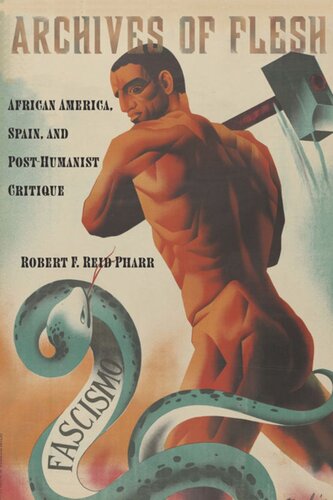

Most ebook files are in PDF format, so you can easily read them using various software such as Foxit Reader or directly on the Google Chrome browser.
Some ebook files are released by publishers in other formats such as .awz, .mobi, .epub, .fb2, etc. You may need to install specific software to read these formats on mobile/PC, such as Calibre.
Please read the tutorial at this link: https://ebookbell.com/faq
We offer FREE conversion to the popular formats you request; however, this may take some time. Therefore, right after payment, please email us, and we will try to provide the service as quickly as possible.
For some exceptional file formats or broken links (if any), please refrain from opening any disputes. Instead, email us first, and we will try to assist within a maximum of 6 hours.
EbookBell Team

4.4
22 reviewsEnlists the principles of post-humanist critique in order to investigate decades of intimate dialogues between African American and Spanish intellectuals
In Archives of Flesh, Robert Reid-Pharr reveals the deep history of intellectual engagement between African America and Spain. Opening a fascinating window onto black and anti-Fascist intellectual life from 1898 through the mid-1950s, Reid-Pharr argues that key institutions of Western Humanism, including American colleges and universities, developed in intimate relation to slavery, colonization, and white supremacy. This retreat to rigidly established philosophical and critical traditions can never fully address—or even fully recognize—the deep-seated hostility to black subjectivity underlying the humanist ideal of a transcendent Manhood.
Calling for a specifically anti-white supremacist reexamination of the archives of black subjectivity and resistance, Reid-Pharr enlists the principles of post-humanist critique in order to investigate decades of intimate dialogues between African American and Spanish intellectuals, including Salaria Kea, Federico Garcia Lorca, Nella Larsen, Langston Hughes, Richard Wright, Chester Himes, Lynn Nottage, and Pablo Picasso. In the process Reid-Pharr takes up the “African American Spanish Archive” in order to resist the anti-corporeal, anti-black, anti-human biases that stand at the heart of Western Humanism.
Enlists the principles of post-humanist critique in order to investigate decades of intimate dialogues between African American and Spanish intellectuals
In Archives of Flesh, Robert Reid-Pharr reveals the deep history of intellectual engagement between African America and Spain. Opening a fascinating window onto black and anti-Fascist intellectual life from 1898 through the mid-1950s, Reid-Pharr argues that key institutions of Western Humanism, including American colleges and universities, developed in intimate relation to slavery, colonization, and white supremacy. This retreat to rigidly established philosophical and critical traditions can never fully address—or even fully recognize—the deep-seated hostility to black subjectivity underlying the humanist ideal of a transcendent Manhood.
Calling for a specifically anti-white supremacist reexamination of the archives of black subjectivity and resistance, Reid-Pharr enlists the principles of post-humanist critique in order to investigate decades of intimate dialogues between African American and Spanish intellectuals, including Salaria Kea, Federico Garcia Lorca, Nella Larsen, Langston Hughes, Richard Wright, Chester Himes, Lynn Nottage, and Pablo Picasso. In the process Reid-Pharr takes up the “African American Spanish Archive” in order to resist the anti-corporeal, anti-black, anti-human biases that stand at the heart of Western Humanism.